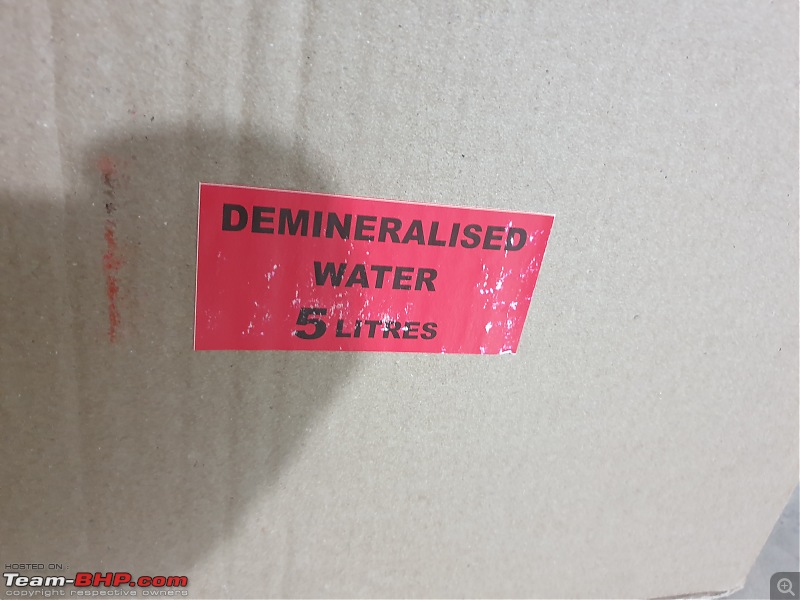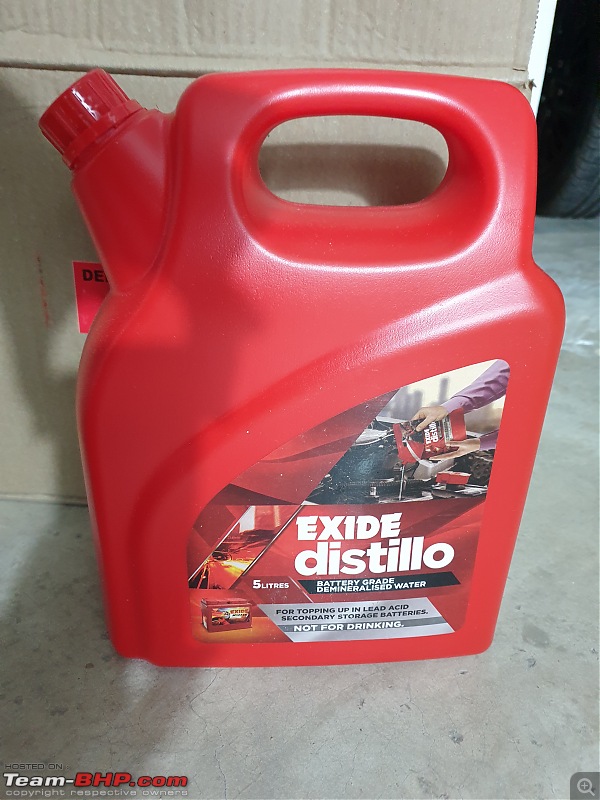Team-BHP
(
https://www.team-bhp.com/forum/)
I have 20 batteries that routinely need a distilled water top up every 3 months. This time, we apparently consumed 80 litres of it. Here's the thing, I got charged 30 bucks per litre!
So the first thing is, I am going to figure out what this distilled water costs around my place per litre. And get this guy good since I haven't paid him yet.
Secondly, I have a Kent R.O. unit in our premises - would this filtered water be good enough to go into the inverter batteries?
Or do I source real distilled water from somewhere? Where? We don't use air-con's so that's out of the question.
What are my options?
Now I'm even more pissed off about the kind of distilled water that has probably gone into my radiator.
And where do I get a genuine HM TDS meter? Amazon India seems to be riddled with fakes!
Anyone knows a good reputable distilled water supplier in Bangalore. I needs to change the coolant in my car and have been holding off since I am not sure of the distilled water quality. Other option is to use premixed coolant which is almost double the price of the usual coolant concentrate.
Quote:
Originally Posted by Traveler
(Post 4529408)
Anyone knows a good reputable distilled water supplier in Bangalore. I needs to change the coolant in my car and have been holding off since I am not sure of the distilled water quality. Other option is to use premixed coolant which is almost double the price of the usual coolant concentrate.
|
In your case I would go with pre-mix and just be done with it as its a one time affair. I will stop using so called distilled water for my automobiles going forward :Frustrati
Sorry, in addition to my original post:
R.O. water seems to be okay to be added to inverter batteries as long as the TDS is under 6 or 7?
Quote:
Originally Posted by Red Liner
(Post 4529391)
I have a Kent R.O. unit in our premises - would this filtered water be good enough to go into the inverter batteries?
|
Nopes, water going through the RO treatment is not distilled or deionized water which is the only type permitted to be used in batteries.
Buy DW from a reputed lab chemical supplier. If possible enquire with colleges, laboratories for their source of supply.
Quote:
And where do I get a genuine HM TDS meter? Amazon India seems to be riddled with fakes!
|
Why do you think these are fakes?
Quote:
Originally Posted by Traveler
(Post 4529408)
Other option is to use premixed coolant which is almost double the price of the usual coolant concentrate.
|
Trust me, premix coolant is worth the extra money. If you can source a premix product go in for it.
Quote:
Originally Posted by R2D2
(Post 4529417)
Nopes, water going thru the RO treatment is not distilled or deionized water which is the only type permitted to be used in batteries.
Buy DW from a reputed lab chemical supplier. If possible enquire with colleges, laboratories for their source of supply.
Why do you say these are fakes?
|
But tell me, the only difference between the R.O and the Distilled water has to be the TDS level right? or am I missing something? Or is it fluoride contamination in R.O.?
God, finding and getting this supplied is a PIA.
Fakes because most of the reviews say its a generic chinese unit with a cheap HM sticker added over it. So Im not sure where I can source a proper HM meter. Edit: Genuine ones will have the HM brand appear digitally on the reader when powered on. Else it gets returned.
Follow on question: Can I dip this meter into the battery directly to test the TDS level, or do I remove the water from it...god, I don't know where to start since 80 litres has already gone in. Granted the batteries are more than 7 years old though.
Why not use AC drain water in batteries? If stored in a clean container, with arrangements in place to keep it covered during collection, I think it should be good enough to be distilled as well as mineral free.
Quote:
Originally Posted by saket77
(Post 4529453)
Why not use AC drain water in batteries? If stored in a clean container, with arrangements in place to keep it covered during collection, I think it should be good enough to be distilled as well as mineral free.
|
I don't run AC's in our office nor at home in Bangalore. Else from now, that would have been my solution.
In other news, though old and staying on subject:
https://timesofindia.indiatimes.com/...w/12918074.cms
lol:
Quote:
Originally Posted by Red Liner
(Post 4529429)
But tell me, the only difference between the R.O and the Distilled water has to be the TDS level right? or am I missing something? Or is it fluoride contamination in R.O.? God, finding and getting this supplied is a PIA.
|
Distilled water is in theory purified water without suspended solid matter and most importantly mineral content. Minerals react with the dilute sulphuric acid in the battery and coat the plates thereby reducing or even blocking their ability to generate electricity. It is a slow gradual process but you will cut down battery life by a significant margin should you use normal water.
Household RO water is NOT "clean" enough to be used in batteries. Alternatively you can use
de-ionized water.
Quote:
Fakes because most of the reviews say its a generic Chinese unit with a cheap HM sticker added over it. So Im not sure where I can source a proper HM meter. Edit: Genuine ones will have the HM brand appear digitally on the reader when powered on. Else it gets returned.
|
If you are really keen on getting a calibrated instrument then you would need to look at professional products which can be expensive. The Chinese stuff may not be top notch but for occasional home use where accuracy is not mandatory as it would be in a laboratory these products are acceptable.
Quote:
Follow on question: Can I dip this meter into the battery directly to test the TDS level, or do I remove the water from it...god, I don't know where to start since 80 litres has already gone in. Granted the batteries are more than 7 years old though.
|
The meter should be dipped into water only. Unless it is designed/built specifically to measure in corrosive liquids
Quote:
Originally Posted by Red Liner
(Post 4529459)
In other news, though old and staying on subject
|
:uncontrol Wish they had fed them battery electrolyte. That'd be fun to watch.
So, does anyone know of a reliable source for distilled water in Bangalore? Reasonably priced of course!
till the mid 90's larger battery shops had a water distilling unit, where one could drop their 5 Lit can and collect distilled water after a few Hrs. Distilling took time, something like 1.5 to 2 Lit per Hr, and there used to be a queue.
In pune we used to go to an exide dealer named Amzell behind the erstwile hotel Amir near station. I think the name of unit makers was Stanback or something and Dynaton.
Best option is to find a old generation battery shop that still has a distilling machine, pay them a bit more and avoid the marketed water.
Rahul
Picked 4 cans of
Exide Distillo, paid Rs. 100 per can(5 Liters).



I don't trust the bottles they sell at battery shops, so picked this as soon as I saw it. Will be giving one can to BHPian Saket77 for his use.
To check TDS - This is a reliable meter.
https://store.mi.com/in/item/3192900018
I use the water from my A/c as distilled water. Its tests very low in the TDS meter and I trust it more from the local bought stuff.
While in Chennai, I used to pick up a brand of distilled water (DM Water) called Diet Aqua. They make DM water, packaged drinking water, club soda and what not. I trusted the brand.
Those who have access to DM water from industry may please ask for a bottle or two from their lab taps; your best bet.
Quote:
Originally Posted by Leoshashi
(Post 4944853)
|
Remember it is demineralized water, not the same as DW. It is fine for batteries and the like, may not be fit for human consumption.
I need some advice. During my first servicing today (for my first car), the mechanic "topped up" the coolant with distilled. When I asked if it was common practice, he said this would be done for the first 2-3 car services (basically all the free ones).
Later I read that a 50-50 mixture of coolant & good quality distilled water is an alternative that is recommended, so that made me a bit comfortable about the situation since I was concerned about the corrosion and rusting.
However, this begs the question(s) - Is this common practice at all service centers? (Mine was a Hyundai). Is this done as a cost-cutting mechanism or there is some technical reason behind it? Should I demand coolant the next time I go for car service?
| All times are GMT +5.5. The time now is 22:00. | |




